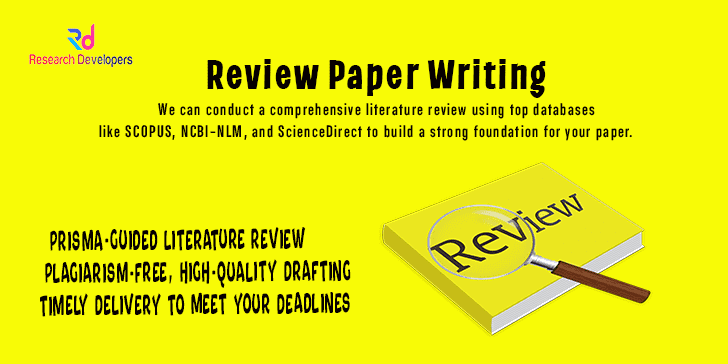Review Paper Writing
Where research begins: Expert guidance on topic selection.

Review paper writing
Before You Begin to Search or Write
Clearly state the subject. A review writer usually works in the same field and is well-versed in the subject, however this isn’t always the case. Select a review topic that contains enough information to support it, but keep the definition of the topic specific enough to keep it focused and limit the amount of possible review materials to a manageable amount.
Choose the strategy you’ll use to write the review. Decide if you want to write objectively or from a position of bias, as well as any assumptions you may have.Provide a justification and a procedure for retaining or dismissing particular sources. Avoid researcher/writer and journal bias, though, as this could sway the outcome of what you would like to be an impartial review. Write out the procedure for your review using this information.
Search for earlier reviews on the subject. Utilize them as a starting point for your own evaluation, offering criticism on the previous reviews, including more recently released content, and perhaps examining an alternative viewpoint. Use their citations as an additional way to explore the literature.
Try to stay as up to date as you can, but don’t ignore historically significant materials.
To arrange, save, and retrieve references, use a reference management system like EndNote, Papers, or Mendeley. Add a source to your Reference list even if you are unable to access it immediately so you can remember where it is and search for it at a later time.
Make sure there are enough primary research publications with comparable methodologies and datasets accessible to support dependable analysis if you intend to do a meta-analysis.
Writing The Review
1. Since effective scientific writing tells a story, give your paper a logical structure with a beginning, middle, and end. Make sure that the information flows and leads readers through it smoothly from beginning to end by using the right headings and concept sequencing. It could be beneficial to organize the review according to a guiding theory, a collection of opposing models, or an opinion on the subject.
2. Write a section outlining the process you used to compile, arrange, evaluate, and combine the data you used for the review. This section is analogous to a scientific research paper’s Methods section in that it should allow the reader to perform a similar type of review, get comparable results, and come to similar conclusions (except in cases where interpretations may vary).
3. Perform a literature analysis that is critical. This could entail deconstructing the subject into its most fundamental aspects, such as the topic’s history and genesis, its main fundamentals, the important relationships by which the fundamentals are interacting, research techniques, as well as applications.
Start by synthesizing the knowledge in a way that provides fresh insight into the subject, rather than just summarizing the literature you are studying
4. Remain concentrated and on topic. Your paper will become coherent and succinct as a result. To do this, making a mind map, narrative board, or other conceptual organizer for the entire work is an excellent first exercise.Make efficient information synthesis images, such as graphs, charts, or other graphics.
5. Provide a solid framework for future research by summarizing recent advancements, pointing out influences that have molded and still impact this field of study, and suggesting a way to settle disputes.
To guarantee that your writing is intelligible, succinct, and clear, go through several edits.
6. Prior to submission, ask a number of reviewers and commentators to evaluate the work. This process should highlight any flaws in the paper’s writing style and structure, encourage the addition of new material, and possibly generate opposing opinions that you would be wise to address right away.
Other Services
- PHD & POST DOC Admission counselling
- Topic Section
- Review Paper Writing
- Systematic Literature Review (SLR)
- Research Paper Writing
- Synopsis Writing/Pre thesis writing
- Thesis Writing
- Data Analysis
- Questionnaire Preparation
- Developing Research Framework
- Methodology Development
- MATLAB Implementation
- Matlab Simulation
- Python Implementation
- Machine Learning Implementation
- Deep Learning Implementation
- VHDL Implementation
- Hadoop
- NS2 Implementation
- NS3 Implementation
- ArcGis Mapping & Analysis
- Spss Data Analysis
- Stata Data Analysis
- Amos Analysis
- R Programming
- E-Views Data Analysis
- Minitab Data Analysis
- Software Testing
- Ansys Implementation

